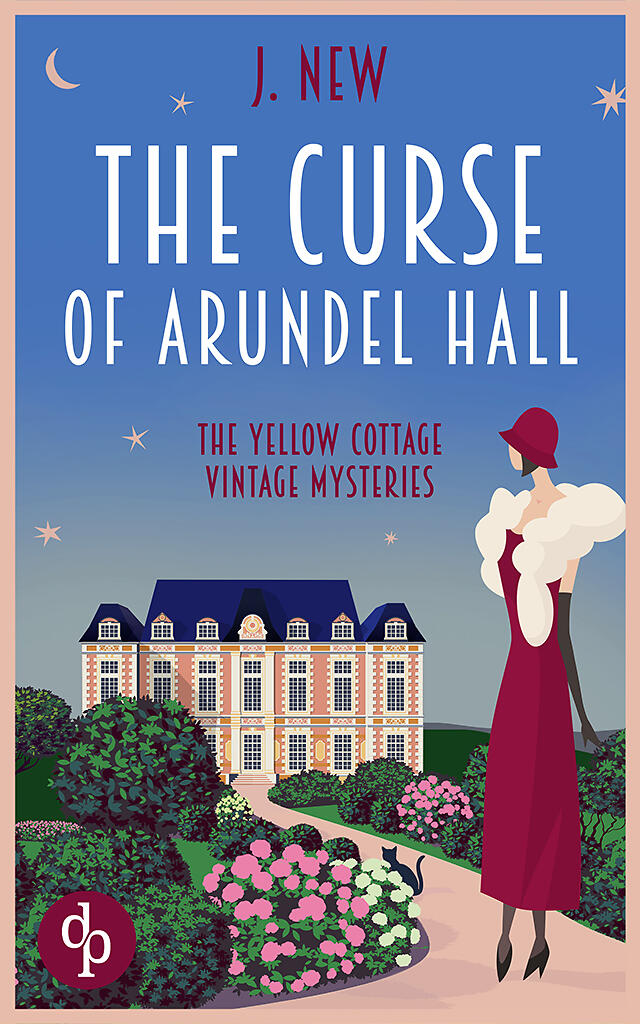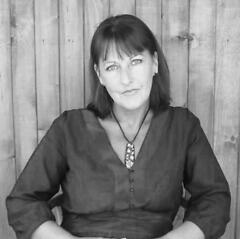CHAPTER ONE
It was never my intention to begin what can now only be described as a career in detective work. I fell into the role of amateur sleuth quite by accident.
My younger brother Jerry and I had grown up in an exceptionally happy and carefree environment. Father owned a textile mill and was the main employer in the area, so as befitted a man of his standing in the community, our house was large. I remember us vividly racing up and down the halls on our bicycles with Patch, our little Jack Russell terrier, snapping at the back wheels.
For afternoon tea on Sundays, unless we'd been invited out, we always toasted our own crumpets on the fire in the small sitting room at the back of the house, then played games as a family until supper, after which we children went to bed.
Christmas had always been a magical time and, in my childish memory, every one of them was white. Large fluffy flakes had drifted lazily down from the sky to cover our lawns and trees in a blanket of snow, and there was always a robin redbreast bobbing up and down on the frozen birdbath, usually stalked by our tom cat Moses. Although being old and rickety of joint, he was never quite fast enough to catch the little bird.
While Christmas Eve and Christmas Day were for the family, for as long as I could remember, Boxing Day was set aside for the workers. After the church service, everybody would trudge back up the snow-filled lane to our house. Invariably, Mother and Father would lead the procession, alongside Jack Scotton, my father's foreman, with his wife and Mr. Pearson the accountant. After that would come the rest of the adult workers, leaving Jerry and me to run back and forth playing with the other children. To me it seemed as though the whole town had been invited.
Once we'd reached the house, the large oak front door would be flung open to welcome our guests and the party would begin. Gifts were given from my family to each of the workers to say thank you for all their hard work that year, and then we'd move to the large dining hall where cook had laid out a sumptuous cold buffet. She'd been preparing it all for days beforehand and for much of that time Jerry and I were camped in the kitchen, where we helped to clean out the bowls and relieve her of any extras. When it was all done, she too took some well-deserved time off and joined in the festivities.
My parents were well-liked and respected by those who worked for them, and this was never more apparent than one day, when I was almost seventeen and Jerry was fifteen, and our lives would forever be changed.
Mother had sheltered us from a lot of what went on, but even then both of us were aware something wasn't quite right. Father was closeted in his study more often and no longer joined us for Sunday tea. There were many times he didn't arise from his bed until after lunch and, as he'd always been an earlier riser, this was particularly unusual. When he did get up, he'd spend his time staring into the fire in the sitting room, morose and silent. What food Mother managed to tempt him with he either barely nibbled at or left completely, and as a result he lost a considerable amount of weight. Eventually, Mother sat us down and explained he'd lost the factory. Even then, with the shock of those words, Jerry and I still didn't fully comprehend the far-reaching implications.
Father, it had turned out, had been caught up in an investment opportunity for which he'd put up the factory as collateral. The investment, while genuine, had failed and as a result he'd lost everything. With the loss of the factory came the loss of our income and as a result we'd had to sell the house and move. But that wasn't the worst of it. Two weeks later, my father, suffering from pneumonia and with his will to live eroded by the guilt of what had happened, passed away.
The funeral was held in the local church and the entire factory workforce came to pay their last respects. For the last time we trudged up the lane to our house and threw open the door to receive our guests. Many wonderful stories were told of Father that day, most of which my brother and I had never heard, and many tears were shed. My father was loved and would be missed by many, but by none more than the three of us.
Later that evening, when everyone else had departed, Jack Scotton and Mr. Pearson remained with Mother, each assuring her they would do all they could to help. Word had obviously spread about our straitened circumstances. True to their word, the very next day both men reappeared to inform her they had negotiated a very favourable deal for us for the sale of the house.
Less than a month later, with the house packed up and everything that hadn't been sold safely in storage, the three of us left our home for the last time. We were to spend the next two and a half years with Aunt Margaret over seventy miles away in Sheffield.
Life with Aunt Margaret more often than not ran smoothly and in the main we all rubbed along quite amicably, but the underlying worry for both of them was of course me and Jerry. Without a paternal figure in his life (Aunt Margaret had never married) and with no business to inherit, Jerry's future was of constant concern to my mother and her sister. However they need not have worried, as Jerry won a scholarship to study "modern greats" at Oxford, and a promising future was assured.
This of course left me, and on that subject the sisters were divided.
My aunt, even with numerous suitors of good pedigree competing for her hand, was a spinster by choice and lived life to its fullest. She had a sharp mind and a rapier wit and was an avid people watcher, as well as a fan of puzzles, having had several of her own published in The Times.
I learned many invaluable lessons at her side and owe much of my success as a detective to her. She was of the opinion I should be left to follow in her footsteps if I wished, and take control of my own life. My mother, on the other hand, was of the opinion a 'suitable match' for me should be found at the earliest opportunity, and no matter how much I pleaded with her on this, she would not budge.
So followed a mind-numbing round of dinner parties and afternoon teas, where I would find myself thrust in front of bored, patronising or over-excitable young men, with whom I had nothing in common and no interest whatsoever. My mother had all but lost hope when I met John, not at one of her interminable soirées, but at a small local bookshop.
We hit it off immediately and after several clandestine meetings, I eventually brought him home to meet the family. Needless to say my mother was ecstatic, my aunt less so, although I paid it little heed at the time. Love is blind as they say, and I was certainly in love. After a courtship and engagement lasting just over a year, John and I were married in the local parish church. I was twenty-one-years-old.
At twenty-three I would become a widow.
After the reported death of my husband, I was advised by his employer to move away from the North of England, take back my maiden name and, aged twenty-three, begin my life again.
"It's for your own safety, Ella," the Home Secretary had said, as we sat in front of a crackling fire, in the parlour of the house John and I had called home for just two short years.
"But I don't understand, Lord Carrick," I choked out over the walnut-sized lump in my throat. "John was just a junior minister for trade. He told me he was helping rebuild our foreign exports to offset the cost of the war. How can that be dangerous to either him or me?"
I'll never forget the withering look on Lord Carrick's face. It was only there fleetingly before he carefully masked his features, but I knew what I'd seen. Pity, tinged with a little guilt perhaps, but it was the scorn and superciliousness that imprinted themselves on my brain. I'd been a naive fool, and at that precise moment, I knew my husband and the life we'd shared together was as artificial as the vase of flowers on the windowsill.
Cast adrift from my home for the second time, I spent the following year with my aunt and my mother while I grieved and contemplated my future.
Often I took the train down to Oxford, booked into a small hotel and spent a few days catching up with my brother. It was during one of these visits that the subject of Linhay came up, which completely changed the course of my life.
It was a glorious summer day, the sky was blue and a warm breeze rustled gently through the foliage. We were enjoying a rather impressive afternoon tea in the gardens of the Trout Inn at Godstow. An impeccably dressed waiter hovered in the background waiting to replenish our cups at a discreet nod. I watched as a punting party came into view under the bridge, and a hand rose, waving at Jerry who returned it with a lazy salute.
"Bickerstaff," he informed me. "His father has a place on Linhay. Invited me down a couple of times, but haven't had a chance to take him up on it yet. Do you remember it?"
"Of course, the yellow cottage," I whispered. I felt my heartbeat increase and a bubble of excitement begin in the pit of my stomach. I knew events thus far had stacked together perfectly to bring me to this pivotal moment. After a year of searching, I realised the island was where I needed to go.
Without knowing it, I was about to embark on a life of murder and mystery.
CHAPTER TWO
The promise of a lovely spring morning had me up and at my desk by seven-thirty. The desk had been my father's, and with her sudden move to the south of France, my mother had had it sent on to me.
"Your father would be pleased to know you had it, darling," she'd said. "He knew how much you loved it."
She was right. The desk was a beautiful oak roll-top with one slim drawer above the knee-hole and three deeper ones down either side. The interior had several cubbyholes, doors and drawers, and the legs were brass capped, culminating in casters that made manoeuvrability simple. Jolly useful when one lived alone.
My original idea when moving to the cottage five months ago was to have a small study area under the stairs. However, with the delivery of the desk, which was far too big for the space, I had moved to the sitting room at the back of the house next to the picture window. There, I could gaze at the garden and the lawns which sloped gently to the river below.
As I was finishing off some last minute correspondence, there was a gentle tap at the door.
"Come in, Mrs. Shaw."
"Apologies for disturbing you, Miss Bridges, but here's this morning's post." She handed me a small bundle held together with a rubber band.
A quick glance at the writing showed me one was from my mother and the other from my aunt, who sent me a new puzzle to solve once a month.
"The postman is waiting to see if you have anything for him to take back?"
"Well, that's very kind of him, but I'm going to the village later, so I will take them myself. Please do pass on my thanks though, Mrs. Shaw."
"Of course, Miss Bridges," she replied, then left, closing the door gently behind her.
Esther Shaw was a tall stocky woman with short iron-grey hair, an almost military bearing in both stance and attitude, and had been in my employ as housekeeper-cum-cook for just over a fortnight. I'd thought it wise to advertise away from the island, small village gossip being what it was, and had placed an advertisement in The Lady Magazine. Surprisingly, hers was the only application I had received. She came directly from employment as housekeeper in a large London home, and said she was used to a busy household where guests dropped in unannounced expecting to be accommodated, and large dinner parties were held on a regular basis. I questioned the fact she might find life in my employ too quiet and rather dull, becoming disillusioned, but she assured me that was what had appealed most about the job. Even though the advert had disappointingly only garnered one applicant, I came to the conclusion Mrs. Shaw was eminently suited to the position. So after a telephone call to her employers, in which they informed me of her excellent credentials and business-like approach to work, along with the fact she was both discreet and honest, I offered her the position and she accepted immediately.
The last two weeks had proved my decision to take her on had been a good one. She was trustworthy and extremely efficient, and although basic, she cooked more than adequate fare for my needs. She had a rather old-fashioned outlook on life and position. I had on a couple of occasions asked her to call me Ella, but she'd refused.
"Oh, I couldn't possibly. There's a place for everything and everything in its place, as my mother always said. You are my employer, Miss Bridges, and it's only right I respect that," she'd insisted, so I'd let it be. Although it was an emotional wrench to be again addressed as 'Miss' when I had once been a wife.
Unfortunately there was one complication. She would not set foot in the pantry, and considering this was where the food was stored, it posed a bit of a dilemma. Of course it wasn't the pantry per se that was the problem; it was the secret dining room beyond and the spirit of a young woman currently stranded there that was the real issue.
A temporary solution had been to remove all the goods and store them in a large cupboard in the kitchen proper, which I'd done last Sunday on Mrs. Shaw's day off. I'd enlisted the help of my brother Jerry, who alongside his wife Ginny and her Godfather Sir Albert Montesford, Scotland Yard's current Police Commissioner, were the only people to know of my special gift.
While this solution pleased Mrs. Shaw, it didn't bring me any closer to solving the real mystery. Just who was the ghost in my dining room? How had she died? And more importantly, where were her remains? I was hoping the visit to the village later would shed more light on the matter. I was going to visit my friend Harriet Dinworthy, a published local historian and founder of the village library. I needed to find out more about my home.



